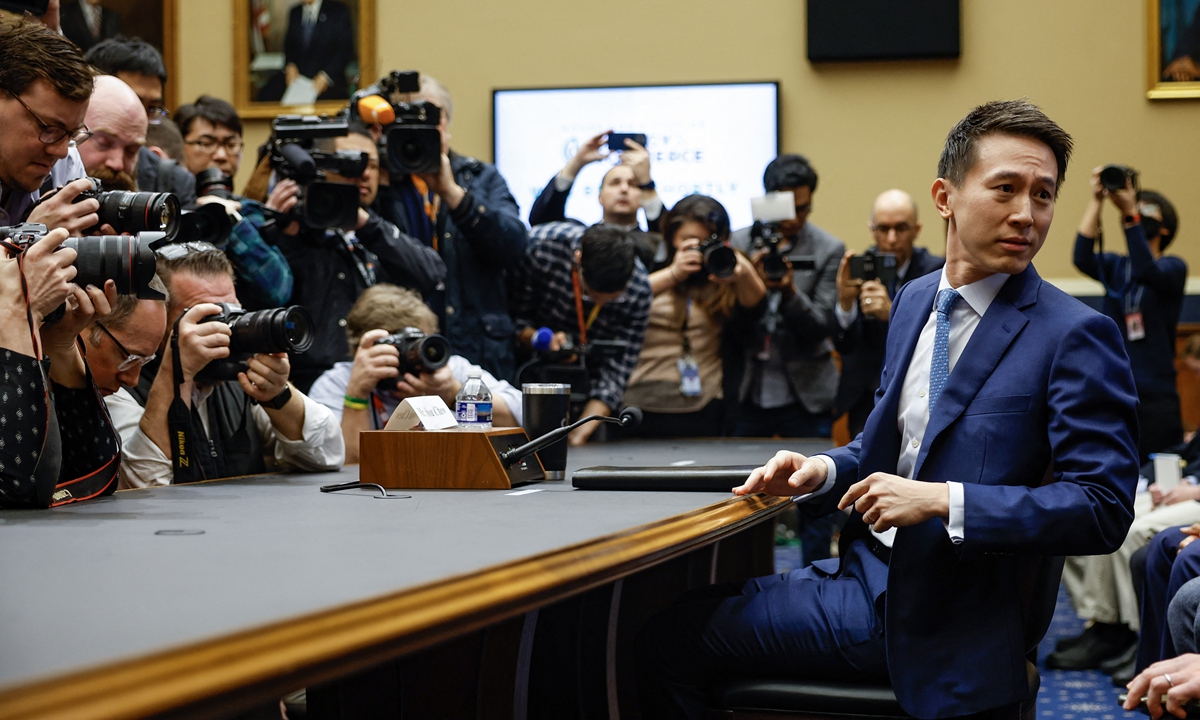
TikTok CEO Shou Zi Chew prepares to testify before the US House Energy and Commerce Committee in the Rayburn House Office Building on Capitol Hill on March 23, 2023, in Washington, DC. Photo: AFP
Starting at 10 am on Thursday local time, the hearing held by the US House Energy and Commerce Committee against short-video platform TikTok lasted for about five hours. If you watch the hearing simply from a perspective of entertainment, then the event doesn't disappoint: The US lawmakers who participated in the hearing can be regarded as "skillful actors" of Washington's political theater, but this time they overacted a little bit, showing their absurdity and arrogance and adding drama to the hearing.
However, this is not a play; it is directly related to the fate of a tech giant with 150 million US users and a question more about how far the US will abuse politics to intrude into business activities. The hearing was "ugly" and "hysterical" even for some US media outlets and many US netizens thought that the lawmakers were extremely rude. The event reflects the surprising and worrying reality of the US political and business environment and sends chills down the spines of all foreign investors in the US market. To a certain extent, it can be said that this is a dark scene in the history of modern business civilization.
This hearing is a comprehensive and thorough revelation of Washington's ugliness, bullying, and hostility toward China. It was called a "hearing," but there was neither "hearing" nor "testimony." Before TikTok CEO Shou Zi Chew could even begin to answer questions, Cathy McMorris Rodgers, the chairperson of the congressional committee, bluntly declared: "Your platform should be banned." Most of the lawmakers at the hearing did not have the slightest patience to listen to Chew's description and explanations, often rudely interrupting him. It was clear that they were not prepared to listen, nor did they have any intention of dialogue or communication.
To be more precise, the hearing was designed from the beginning to be a TikTok "struggle session" with the presumption of guilt, a trumped-up charge, and judgment before trial in which no evidence was presented, nor was TikTok given the time or opportunity to prove itself. People were impressed by the unprofessionalism of the questions asked by the US lawmakers, the madness of their anti-China thinking, and the embarrassment of talking without communicating. It feels like these people are here to wreak havoc. And frankly speaking, this is worse than holding down a job without doing anything, as the latter is merely a waste of taxpayers' money while causing less damage. We wonder who we should pity, as Washington's politics, especially when it comes to strategy toward China, is controlled by such a group of extreme politicians and poisoned by such an atmosphere.
It can be determined that no matter how strong the evidence is, these US lawmakers will never be convinced, just like it's impossible to wake up someone who's pretending to sleep. Chew's statements at the hearing were in strong contrast with the US lawmakers, and this was demonstrated not only inside the hearing room but also to the whole world. Justice lies in people's hearts, and the hearing exposed the twists and turns of this matter. The Congress is a symbol of American political power. Its flaws, such as forced intervention in normal business activities, contempt and trampling of the market economy and fair competition, and abuse of "national security," were vividly showcased in this hearing.
Until today, the US government has never provided evidence proving that TikTok presents a threat to its national security. The questions raised by the lawmakers are based on nothing more than assumptions and theories. Such a hearing can only prove Washington's bandit logic. After trying everything in the book to force a sale of TikTok and failing, it now seems the US is resorting to robbery. Washington now acts like a savage from the jungle breaking into modern civilized society. China's attitude is firm and clear. China will firmly oppose the sale or forced divestment of TikTok. As this involves technology exports, the administrative licensing procedures must be fulfilled according to China's laws and regulations, and the Chinese government will make decisions under the law.
To some extent, the scene presented at the TikTok hearing is fairly representative: On one side is a global high-tech company representing openness, innovation, and vitality; on the other side are political elites with a Cold War mentality who cling to closed, outdated, and confrontational ideas. On one side are young Americans who embrace new technology and strongly support TikTok, while on the other side are stubborn people who would rather stagnate or regress and "kill their opponents." This is more like a confrontation between old and new forces, in a scene that is also lamentable: The mentality in Washington has, indeed, gone awry.
This "Congressional hunt for TikTok" has once again torn off the glamorous facade of Washington's so-called values and strengthened transnational corporations' sense of insecurity in the US. It was Toyota in the past, TikTok now. Who will be next? If it happened once, it can happen again. People cannot remain indifferent to this.




